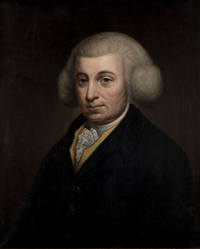Charles O'Conor (historian)
| Charles O'Conor, | |
|---|---|

Charles O'Conor of Belanagare.
|
|
| Born | 1 January 1710 Killintrany, County Sligo, Ireland |
| Died | 1 July 1791 (aged 81) Bellanagare, County Roscommon, Ireland |
| Occupation | Writer, Antiquarian |
| Nationality | Irish |
| Notable works | Dissertations on the ancient history of Ireland |
| Spouse | Catherine O'Fagan |
| Children | 4 (Denis, Charles, Bridget, Anne) |
Charles O'Conor, O'Conor Don (Irish: Cathal Ó Conchubhair Donn; 1 January 1710 – 1 July 1791), also known as Charles O'Conor of Belanagare, was an Irish writer and antiquarian who was enormously influential as a protagonist for the preservation of Irish culture and history in the eighteenth century. He combined an encyclopaedic knowledge of Irish manuscripts and Gaelic culture in demolishing many specious theories and suppositions concerning Irish history.
O'Conor was a protagonist for Catholic civil rights in eighteenth century Ireland. He worked relentlessly for the mitigation and repeal of the Penal Laws, and was a co-founder of the first Catholic Committee in 1757, along with his friend Dr. John Curry and Mr. Wyse of Waterford. In 1788 he became a member of the Royal Irish Academy.
His collection of manuscripts and manuscript copies, annotated with his copious notes and comments, made up the first part of the Annals of the Four Masters (originally the property of Fearghal Ó Gadhra) that were collected at the Stowe Library, and at that time many of them were the only copies known to exist.
Charles O'Conor was born in 1710, in County Sligo, to a cadet branch of the land-owning family of O'Conor Don and was sent for his education to Father Walter Skelton's school in Dublin. He grew up in an environment that celebrated Gaelic culture and heritage. He began collecting and studying ancient manuscripts at an early age.
His marriage brought him financial stability so that he could devote himself to his writing, but he was widowed in 1750, within a year of his father's death, when he himself assumed the role of the O'Conor Don. When his eldest son Denis married in 1760, he gave up the residence at Bellanagare to him and moved into a small cottage that he had built on the estate. He would devote the remainder of his life to the collection and study of Irish manuscripts, to the publication of dissertations, and especially to the cause of Irish and Catholic emancipation.
...
Wikipedia
